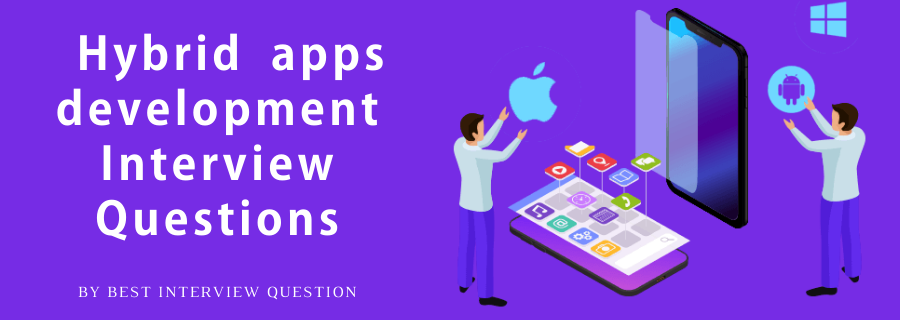
Most Frequently Asked Hybrid apps development Interview Questions
Here in this article, we will be listing frequently asked Hybrid apps development Interview Questions and Answers with the belief that they will be helpful for you to gain higher marks. Also, to let you know that this article has been written under the guidance of industry professionals and covered all the current competencies.
The ANR or Application Not Responding is a dialog box that appears when an application doesn’t respond for more than 10 seconds. The dialog box gives users the option of whether wait till the app finish its running or to close the app.
Scoping for a hybrid mobile app starts with a long, hard review at the device as mobile devices offer different screen size, form factors, resolution, functionality and computing power. The developer has to understand the invention and how it can be used to achieve the best advantages while ensuring excellent user experience.
A mobile app will be notified whenever the operating system moves the apps between background and foreground. The operating system has to bound the environment run off a mobile application to improve the battery statistics.
This will also help with improving the user experience with the foreground app.
This is a good question concerning hybrid apps interview questions and answers.
The best developer and business preferred hybrid mobile app frameworks are as following: Ionic, PhoneGap, Accelerator Titanium, Kendo UI, Intel X DX, and Mobile Angular UI.
A native mobile application has the following disadvantages compared to a hybrid mobile app:
- Difficulty while testing new functionality
- Even small changes in a native mobile app require a recompile which slows up the whole development process
- Calls between interpreted and native environment could end up blocking UI thread.
PhoneGap is a library which exposes native mobile phone functionalities as JavaScript API. After Adobe overtaking PhoneGap, it’s open source core was donated to Apache Software Foundation with the Cordova name. Ionic used Cordova as for its core tools. Ionic offers all the native mobile phone functionalities and provides code and structural scalability to JavaScript applications by using Angular JS.
With the collection-repeat directive that renders visible items only in the DOM, developers can present huge item lists without affecting the scroll performance. As items visible in a viewport are only provided with this process, the scroll performance will not be affected.
The principal difference between PhoneGap and AIR is that developers can build PhoneGap application using HTML, JavaScript, and CSS, but developers make AIR applications using tools rooted in the Flash Platform.
PhoneGap applications are usually executed inside the native web browser component for every supported platform, whereas AIR applications only the AIR runtime which enables developers to have a single code base with the exact similar behavior through all supported platform.
The Cordova has few limitations that we can expect with every hybrid mobile app framework.
- Not great to use for large applications that required lots of functionality and data as hybrid applications are slower compared to the native ones.
- As it supports cross-browser compatibility, lots of issues and bug could be faced with time, again which may require appropriate testing and optimization to cover.
- The issue may arise with plug-in compatibility with the different platforms and devices.
The manifest file is a must-have recorded in the root directory of every Android app named as 'AndroidManifest.xml'.
This file includes crucial information about the app, including the application’s Java packages name.
An Intent can be described as an ‘intention’ to do an action. It’s a message to inform developers about the activity they did or if something that to happen. Applications and OS will react accordingly to the intent.
Android has two types of intent:
- Explicit Intent
- Explicit Intent
As AngularJS is used Ionic applications, it has a rich set of test libraries such as Jasmine and Karma available to support the testing functionalities. These available frameworks can be used by developers to write the unit tests for Iconic applications.
The application provides live reload feature so the application can be easily tested over the browser.
The ‘ionic prepare’ function copies all the files from the WWW folder to the target platform’s WWW folder, whereas the ‘ionic build’ function performs the same while building the app’s source code so that the app can be run on an emulator/simulator or a device.